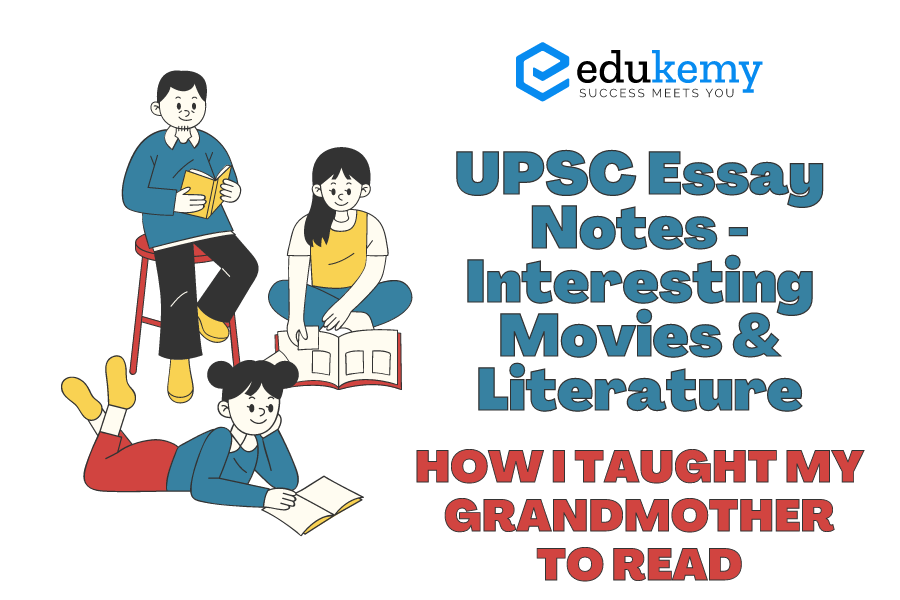
The intersection of literature and film has always been a captivating realm where stories unfold, characters evolve, and profound insights into the human condition emerge. In the realm of educational value, these mediums serve not only as sources of entertainment but also as powerful tools for learning and introspection. “How I Taught My Grandmother to Read,” a compelling narrative penned by renowned Indian author Sudha Murty, is a testament to the transformative potential of storytelling. As we delve into the exploration of this narrative, we uncover layers of wisdom, cultural insights, and timeless lessons that resonate far beyond the confines of its pages. Through the lens of this captivating tale, we embark on a journey that traverses the realms of familial bonds, the power of literacy, and the profound impact of simple acts of kindness. In this essay, we shall delve into the fascinating nuances of “How I Taught My Grandmother to Read,” examining its relevance, its portrayal in literature, and its potential implications for broader societal discourse.
It is an excellent short fiction written by prolific author Sudha Murthy. In this story she highlights how in her childhood she would read aloud episodes of Kashi Yatre, a weekly journal written by Triveni, to her grandmother. Those were the times when Triveni was quite popular among general readers. Once the narrator had to attend a marriage ceremony due to which she went to a different village. She was supposed to go back to her village in a couple of days, but she returned only after ten days. In the meantime, the next episode of Kashi Yatre was already published. Her grandmother felt helpless since she could not read the episode in the absence of the narrator. That was when the grandmother realised that regardless of coming from a well to do family, she was unable to read the next episode. She was in a sorry state since she was dependent on the narrator for such a minute task. That was when she took the oath that she would learn to read Kannada with the help of the narrator and set Dussehra day as the deadline. On Dussehra day, she touched the narrator’s feet despite their age difference and thanked her.
Contents
- 1 Moral
- 2 Frequently Asked Questions (FAQs)
- 2.1 Q: What is the significance of interesting movies and literature in UPSC essay notes?
- 2.2 Q: How can movies contribute to essay preparation for the UPSC exam?
- 2.3 Q: What role does literature play in enhancing UPSC essay writing skills?
- 2.4 Q: How can the essay “How I Taught My Grandmother to Read” contribute to UPSC preparation?
- 2.5 Q: In what ways can candidates effectively integrate insights from movies and literature into their UPSC essays?
- 3 To get free counseling/support on UPSC preparation from expert mentors please call 9773890604
Moral
- Age is just a number. In other words, learning a skill has more to do with one’s passion and dedication than age.
- You can learn new things from every corner of life.
Frequently Asked Questions (FAQs)
Q: What is the significance of interesting movies and literature in UPSC essay notes?
A: Interesting movies and literature serve as invaluable sources of inspiration and knowledge for UPSC essay preparation. They provide diverse perspectives, cultural insights, and critical thinking exercises, enhancing the candidate’s ability to analyze complex issues effectively.
Q: How can movies contribute to essay preparation for the UPSC exam?
A: Movies offer a visual medium through which candidates can explore socio-political themes, historical events, and cultural dynamics. By critically analyzing narratives, character development, and cinematography, candidates can develop nuanced perspectives and enrich their essay content with relevant examples and insights.
Q: What role does literature play in enhancing UPSC essay writing skills?
A: Literature exposes candidates to a wide array of human experiences, societal norms, and philosophical ideas. By delving into literary works, candidates develop empathy, critical thinking, and the ability to articulate complex ideas coherently. Literary analysis also helps in understanding various themes and their applicability to real-world situations, thus enriching essay content.
Q: How can the essay “How I Taught My Grandmother to Read” contribute to UPSC preparation?
A: “How I Taught My Grandmother to Read,” a poignant narrative by Sudha Murty, offers profound insights into the transformative power of education and the importance of literacy in empowering individuals. By studying this essay, candidates can explore themes such as education, social inequality, and personal growth, enriching their understanding of societal issues and their implications.
Q: In what ways can candidates effectively integrate insights from movies and literature into their UPSC essays?
A: Candidates can draw parallels between cinematic/literary narratives and real-world scenarios to illustrate complex concepts and support their arguments. By analyzing character motivations, plot developments, and thematic elements, candidates can offer nuanced perspectives on socio-cultural issues, demonstrating their analytical prowess and depth of understanding to UPSC examiners.
To get free counseling/support on UPSC preparation from expert mentors please call 9773890604
- Join our Main Telegram Channel and access PYQs, Current Affairs and UPSC Guidance for free – Edukemy for IAS
- Learn Economy for free- Economy for UPSC
- Mains Answer Writing Practice-Mains Answer Writing
- For UPSC Prelims Resources, Click here

